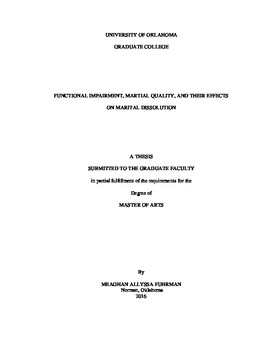| dc.description.abstract | Numerous studies show evidence that personal health affects marital relationships, and therefore, marital dissolution. However, little work examines the effects of functional impairment on marital dissolution. Moreover, few studies examine functional impairment’s impact on marital quality, a mechanism by which functional impairment may affect marital dissolution. Using three waves of publicly available, de-identified data from National Survey of Families and Households, I investigate the relationship between functional impairment, marital quality, and marital dissolution in both the short-term as well as the long-term. I also investigate whether this relationship differs between men and women, as functional impairment threatens gender roles differently within a marriage. I find that only in one instance does functional impairment increase the odds of divorce, and in some cases, functional impairment decreases the odds of divorce. I find that marital quality does not mediate the relationship between functional impairment and divorce, nor does the relationship between functional impairment and divorce differ between men and women. | en_US |
